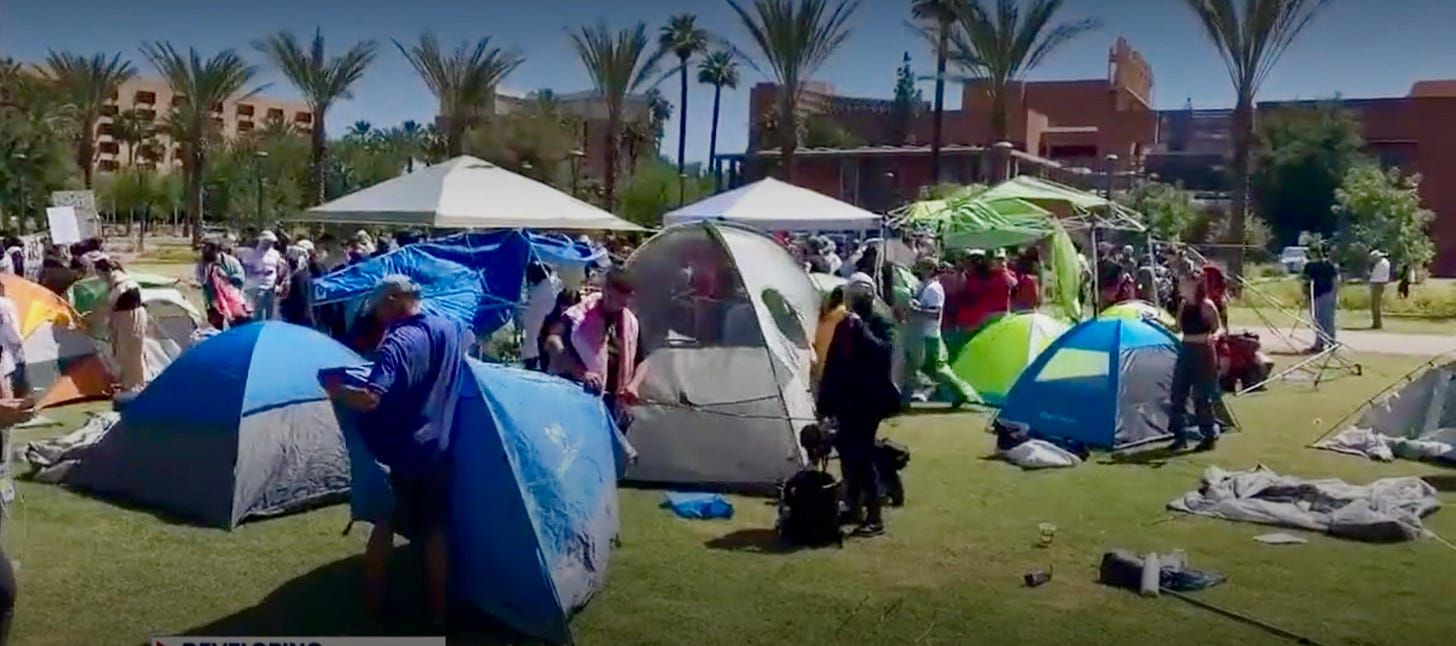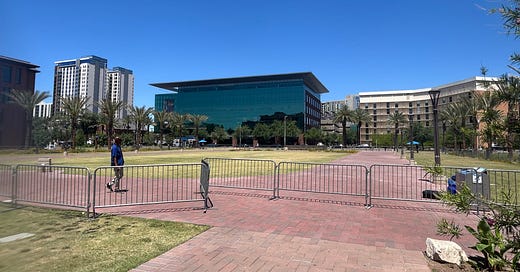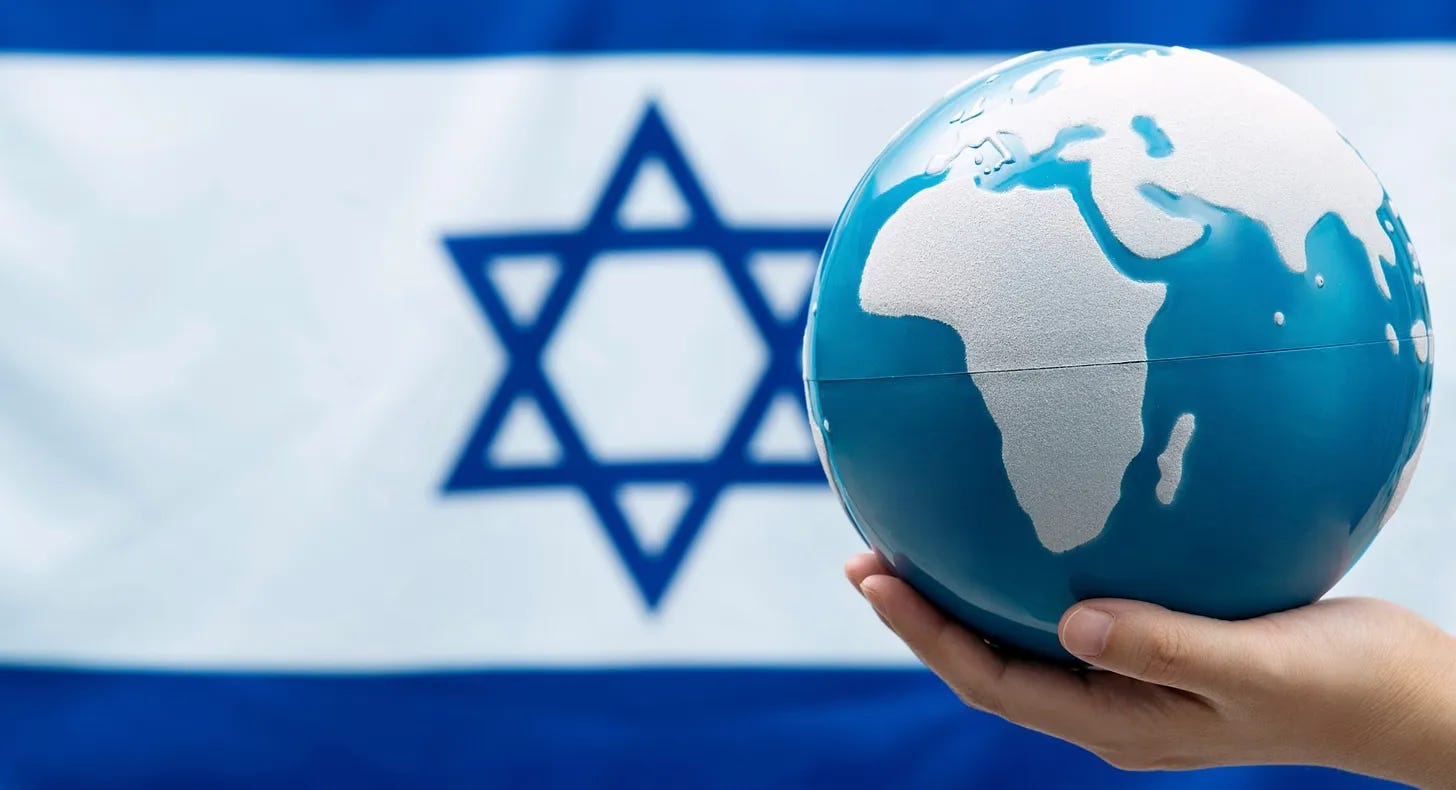Protesters: A Few Questions
"Wouldn’t it be a better idea to protest against Hamas — and for a political process where Palestinians might get the power to choose different leaders and a different future for themselves?"
By Michael Golden
Yesterday I drove to the ASU campus where I used to teach, and walked to “Alumni Lawn” — the location where about 100 pro-Palestinian protesters had gathered over the weekend. Sixty-nine were arrested.
I was hoping to meet a couple of students who were involved in the protest and ask them a few questions. But when I got to the Lawn, it was empty. Just steel barricades walling it off and a couple of security people.
Nearby, a soon-to-be graduating senior was wearing her processional sash and having her picture taken at the historic Old Main Building. Five minutes later, another did the same. I spoke with them for a bit; none had been at the protests. They said they hadn’t heard much about it.

To be clear: The protesters on campuses that you see splashed across every local and national TV outlet — they are actually far less than even a statistical sampling error. ASU has more than 77,000 students in Tempe and Phoenix, so 100 represent .01 percent. At Columbia in New York, where there’s more noise, it’s just 300 people out of 36,000 (or .08 percent). And they’re not even all students.

It may sound like I’m discounting the effects of the college protests — I am not. But first let’s have some perspective on all of this. I taught many of these students for several years. They are overwhelmingly interested in what they’re studying, what their future is going to look like, and who they’re interested in socially (not necessarily in that order).
The young people I taught were smart. That is not to say that all of them were well-informed about public policy or steeped in historical knowledge. That’s part of why they’re in college!
I taught in the School of Politics and Global Studies, focusing mostly on American government and campaign politics. What the students said they loved most about those courses was the open discussions/debates we would have. All opinions welcome, but back them up. All conversations civil. And no ascribing negative motivations to others.
Those experiences with students taught me that young people are among the most open-minded you’ll come across. But they don’t want to be lectured about how you’re so sure that what they think is wrong. This is generally true in life. A far better strategy for getting people to see another side of an issue is asking questions.
That’s what I wanted to do yesterday. But I’m going to lay them out here instead. And if anyone wants to share these with any young folks who are interested, great. These questions are not directed at adult demonstrators who’ve shown up (or agitated for) the protests. I believe they’re lost causes, and like me, they’re not gonna be around that much longer. The world belongs to next generations.
Last note to young people who may consider these questions: None of them are meant to be in the least bit patronizing. But they will only be relevant to you if you do not already have an overall antisemitic disposition towards all Jews. If you do have such visceral hatred, I hope you’ll go deal with it soon.
For all others, here we go:
1) Since you are here protesting, I assume it’s safe to say that you are deeply concerned about the Palestinian people. If so, what is the first specific thing you want to accomplish on their behalf through the protests? What’s the goal?
2) If the answer to 1) is to try to end the war, do you support the current cease-fire proposal (or previous ones) that the Israeli government has offered to Hamas? If not, why not?
3) Perhaps you provided a more general answer to 1) — that you want the Palestinians to have independence and a safe and secure future. Maybe even a democratic one. If so, the follow-up question is: Do you think that’s possible while Hamas is making the decisions for all Palestinians — and while the people cannot vote for or against those who are in charge? This is one of the most important questions. If you really want to see Palestinians have a better quality of life, you have to ask yourself: How much do you know about Hamas?
4) Generally speaking, it can be a very righteous thing to protest with a true intention to make life better for a people if you believe they are being oppressed. But what if the people on the other side of such a conflict have themselves been oppressed, with an exponentially larger number of lives lost to violence over the centuries? Even within the last 80 years. If you were a part of that people, would you not try to ensure that this never has the chance to happen again?
If you considered these questions above, and none have moved you to see another side to this age-old conflict, then I have failed.
If, however, you do see the logic in the questions, let me try to anticipate one counter-question you might have:
“Michael, if you want people like us to consider the plight of Jewish Israelis, then likewise shouldn’t we be able to demand that you consider the pain of the Palestinians?”
Speaking for myself, on the face of it, of course. I don’t like to see any people undergoing suffering for no reason. It goes against everything I was brought up to believe in. And if you talk to a whole lot of other Jewish people, they will express the same sentiment. Did you know that since Israel’s very inception, they have extended a hand and their land to live side by side in peace many times? This is precisely how Israel and Egypt negotiated a peace that has now lasted for more than 30 years.
But here’s the rub, and thanks for being curious enough to make it to this point:
It all comes back to question 3). You have to ask yourself: Why is Hamas in charge? Do Palestinians who want peace and a better life — do they approve of Hamas’s desire to rid the planet of Jews?
If they disapprove, and want a new government that has the freedom to seek and achieve a peaceful coexistence in Israel — then ask yourself one final question:
Wouldn’t it be a better idea to protest against Hamas — and for a political process where Palestinians might choose a different future for themselves?
I pray you dig a little into the history of this long-running conflict. Israelis have never intended to eliminate all Palestinians from Israel. Yet Hamas and a large portion of Palestinians do not feel the same way.
Israelis don’t want wars. They want peace. But it’s nearly impossible to make peace when the opposing side does not want peace; they want annihilation.
So, as you protest on campuses, please keep asking yourself that quintessential question: what would you do about Hamas?
MICHAEL GOLDEN is the Editor-in-Chief of JEWDICIOUS.
From unpacking history and politics to navigating the nuances of family and personal relationships to finding the human angle on sports and entertainment — plus our unsparing take on what’s happening in the Jewish world — the canvas at JEWDICIOUS is limitless! JOIN US!!






Amazing questions that I would hope that the leaders and faculty of our finest Universities can ask themselves and understand that the way to move forward is through this type of dialogue. Some of the most damaging folks on the lawn I feel are also supported and funded by "others" that they have never and will never know directly.. very sad what will become of the future for these young people.
Here were my questions for them,, which I posted as a (very) long FB status update:
1) Is there any other country that you feel doesn’t have a right to exist? Literally, any other country in the world that you would describe as “illegal”?
2) You constantly accuse Israel of committing genocide. Is there any other country on the planet against which you make a similar claim? Are you aware of what Russia is doing in Ukraine, and do you know anything about what it did in Bucha? Are you aware of any how many Arabs in general and Palestinians in particular died in the Syrian civil war? Did you protest at all over what has been going on for years in Sudan and Yemen, or do you only get agitated when you can blame Jews?
3) You constantly repeat Hamas talking points, including/especially its claims regarding civilian casualties. Why do you accept its numbers but completely dismiss any numbers from Israel?
4) You scream repeatedly that you want a “ceasefire now”. Are you aware that there was a ceasefire in effect until the morning of October 7th, and Hamas has broken every ceasefire agreement that was in place? Does that matter at all to you? Are you honest enough to admit that it’s really only Israel which you want to “cease firing”, and that you’re perfectly fine if Hamas continues to lob rocket after rocket at Israel, and that what happened on October 7th didn’t bother you at all?
5) What should happen to the remaining hostages that Hamas is holding, and has been holding for over six months now? Should Israel just forget about them?
6) What SHOULD Israel have done after October 7th? No country on the planet would accept what happened that day without responding.
7) You keep referring to Israel as a “settler/colonial” project. Colony of which country/ies? Where do you think the Jewish people came from?
8 ) I’m giving you a magic wand: You can erase Israel from the map. Where are the approximately 8,000,000 Jews who live there going to go? Judging by your protests here in the west, I think that we can safely assume that you don’t want them where you live. So, where should they go?
9) You claim that the Jewish people are not actually from Israel and therefore, have no right to be there. You’re parading around streets/campuses in North America screaming just that. Are you Native American? If not, how did you get here? Are you prepared to immediately go back to the country/ies where your ancestors originated?
10) You claim to not hate Jews, and that’s it’s only “Zionists” and/or Israelis who you dislike, but your protests are full of signs comparing Jews to Nazis and singing the praises of Hamas, an organization which has called for Jews worldwide to be wiped out. How do you reconcile those positions?
11) Not long ago, many of you were out on the streets, protesting that we should believe women when they claimed that they were raped and assaulted, a position with which I agree entirely, BTW. Yet, when Israeli women make that claim, you shout it down and/or deny that it even happened. Admittedly, some of you will concede that it happened, but then you follow it up with a claim that it was “justified”. Why is it “justified” only when Israeli women are the victims?